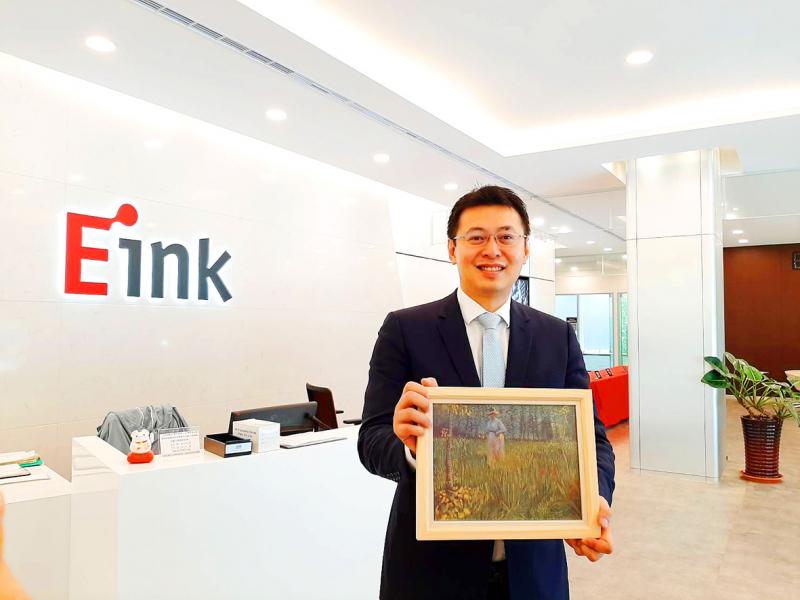E Ink Holdings Inc (元太科技), the world’s sole supplier of e-paper displays for e-readers and electronic shelf labels, yesterday gave a positive outlook for the second half of this year, as the COVID-19 pandemic is stimulating demand.
The Hsinchu-based company said that the pandemic is accelerating adoption of its labels as retailers seek to avoid virus transmission routes, as well as enhancing delivery efficiency.
The pandemic “is increasing demand, as we expected,” E Ink chairman Johnson Lee (李政昊) told an investors’ teleconference. “Because of the pandemic, there has been an increase in the number of retailers asking about how labels would help them improve delivery efficiency.”

Photo: Chen Mei-ying, Taipei Times
In the first two quarters, e-paper shipments for labels reached what it shipped for the whole of last year, Lee said.
“We are bullish about the label business,” he said.
Shipments of e-paper displays are expected to grow at an annual rate of 20 to 30 percent this year and growth might be even stronger next year, E Ink said.
A mere 4 percent of the world’s retailers have replaced paper labels with electronic ones, so there is ample room for growth, the company said.
Demand for e-readers is also improving this quarter from a slump in the first half due to seasonal factors as well as the work-from-home and remote learning trends, it said.
Demand for E Ink’s new color e-paper displays, dubbed Kaleido, has also improved and the firm is boosting capacity 10-fold, it said.
Kaleido displays are primarily for e-books or e-reader, targeting the education market, E Ink said.
China is the first market it entered, it said.
E-paper displays for e-readers accounts for 60 percent of the firm’s revenue, it said.
E Ink chief financial officer Lloyd Chen (陳樂群) said that the company is investing in low-risk financial products to offset a decline in royalty income.
Non-operating income, which is mostly from royalties, would be flat this year from last year, Chen said.
E Ink’s investment strategy has proven to be workable as its non-operating profit only dipped 7 percent year-over-year to NT$1.58 billion (US$53.54 million) in the first half, while royalty income shrank about 17 percent to NT$948 million.
In the first half, E Ink’s net profit soared 33 percent to NT$1.76 billion from NT$1.32 billion a year earlier. Earnings per share rose to NT$1.55 from NT$1.16 over the same period.
Gross margin climbed to 44.1 percent in the first two quarters from 41.9 percent in the same period last year.
Revenue inched up 2 percent to NT$6.65 billion from NT$6.51 billion a year earlier.

Zhang Yazhou was sitting in the passenger seat of her Tesla Model 3 when she said she heard her father’s panicked voice: The brakes do not work. Approaching a red light, her father swerved around two cars before plowing into a sport utility vehicle and a sedan, and crashing into a large concrete barrier. Stunned, Zhang gazed at the deflating airbag in front of her. She could never have imagined what was to come: Tesla Inc sued her for defamation for complaining publicly about the vehicles brakes — and won. A Chinese court ordered Zhang to pay more than US$23,000 in

Taiwan Semiconductor Manufacturing Co (TSMC, 台積電) yesterday said that its investment plan in Arizona is going according to schedule, following a local media report claiming that the company is planning to break ground on its third wafer fab in the US in June. In a statement, TSMC said it does not comment on market speculation, but that its investments in Arizona are proceeding well. TSMC is investing more than US$65 billion in Arizona to build three advanced wafer fabs. The first one has started production using the 4-nanometer (nm) process, while the second one would start mass production using the

A TAIWAN DEAL: TSMC is in early talks to fully operate Intel’s US semiconductor factories in a deal first raised by Trump officials, but Intel’s interest is uncertain Broadcom Inc has had informal talks with its advisers about making a bid for Intel Corp’s chip-design and marketing business, the Wall Street Journal reported, citing people familiar with the matter. Nothing has been submitted to Intel and Broadcom could decide not to pursue a deal, according to the Journal. Bloomberg News earlier reported that Taiwan Semiconductor Manufacturing Co (TSMC, 台積電) is in early talks for a controlling stake in Intel’s factories at the request of officials at US President Donald Trump’s administration, as the president looks to boost US manufacturing and maintain the country’s leadership in critical technologies. Trump officials raised the

From George Clooney to LeBron James, celebrities in the US have cashed in on tequila’s soaring popularity, but in Mexico, producers of the agave plant used to make the country’s most famous liquor are nursing a nasty hangover. Instead of bringing a long period of prosperity for farmers of the spiky succulent, the tequila boom has created a supply glut that sent agave prices slumping. Mexican tequila exports surged from 224 million liters in 2018 to a record 402 million last year, according to the Tequila Regulatory Council, which oversees qualification for the internationally recognized denomination of origin label. The US, Germany, Spain,